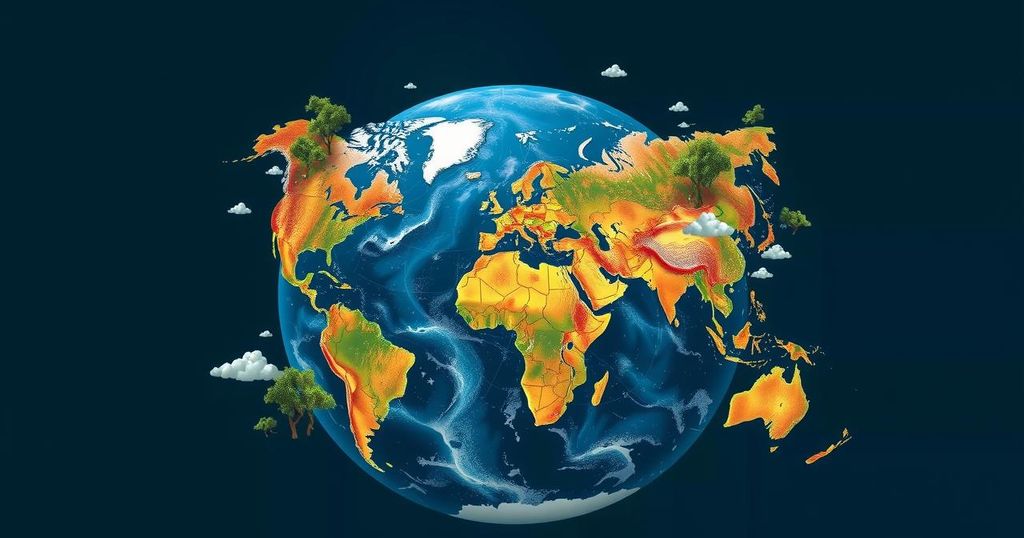The likelihood of Donald Trump’s reelection raises concerns about his administration’s impact on global climate initiatives, particularly following his previous withdrawal from the Paris Agreement. Experts predict that a second term could further diminish U.S. participation in international climate frameworks, prompting other nations to either step up or withdraw. The upcoming U.N. climate negotiations will be critical for assessing the durability of global climate action amid shifting U.S. policy.
The potential return of Donald Trump to the presidency raises concerns regarding the future of global climate initiatives. During his previous term, the United States’ withdrawal from the Paris Agreement prompted states, cities, and businesses to compensate for the federal government’s retreat from climate leadership. Experts warn that a second Trump administration may provoke deeper cuts to international climate commitments, undermining collaborative efforts to combat climate change. Rob Jackson, a climate scientist at Stanford University, stresses that achieving climate goals is impossible without significant participation from the U.S., China, and Europe, noting that global carbon emissions are still on the rise. In light of Trump’s election victory, the world faces increasingly severe climate-related events, including extreme temperatures and natural disasters. Laurence Tubiana, former French official and architect of the Paris Agreement, views Trump’s reelection as a significant setback for global climate action but remains optimistic about the Agreement’s resilience. The forthcoming United Nations climate negotiations in Baku will serve as a critical test for international climate cooperation. Observers speculate that the European Union and China may enhance their climate commitments in response to a diminished U.S. presence. Historic precedents suggest that when the U.S. has abandoned international agreements, other nations often step up, as seen in 2017 when no country followed the U.S. out of the Paris Agreement. However, experts caution that a more profound withdrawal could ensue, with implications extending beyond climate accords to core treaties established in 1992. In the event that the U.S. fully withdraws from the 1992 Rio conventions and the accompanying United Nations climate change framework, experts believe it would severely hinder U.S. participation in future discussions. David Waskow of the World Resources Institute emphasizes that such a pullout would effectively marginalize the U.S. from critical international negotiations. The dynamic of alternating administrations leads to uncertainty for countries dependent on U.S. commitment, as Joanna Depledge notes that Trump’s potential term could represent four years of stalled climate progress. Despite these challenges, there remains a strong belief in global action against climate change. Christiana Figueres, former U.N. climate chief, underscores the importance of grassroots initiatives as vital threads in the fabric of climate advocacy. As nations prepare for discussions regarding aid to developing countries in their climate efforts, it is evident that the stakes are higher than ever, with imminent deadlines established by international agreements. The juxtaposition of local and global action against climate change is imperative, emphasizing the notion that while U.S. leadership may waver, the momentum for climate initiatives continues.
The ongoing global climate crisis necessitates significant contributions from major economies, particularly the United States and China. Historically, U.S. policies have fluctuated with shifting administrations, impacting international climate accord dynamics. With Donald Trump’s potential reelection, concerns have arisen regarding a possible regression in global climate commitments. Past actions, such as Trump’s withdrawal from the Paris Agreement in 2017, demonstrated how domestic policies can reverberate on the global stage, influencing other countries’ climate strategies and ambitions. As international negotiations in the forthcoming United Nations climate conference approach, the ramifications of U.S. policy on global climate efforts remain profoundly significant.
In conclusion, the prospect of a Trump 2.0 administration poses serious concerns for international climate initiatives, with experts predicting a significant regression in U.S. climate leadership. The response of other nations, particularly China and the European Union, will be pivotal as global negotiations unfold. While optimism persists regarding grassroots actions and the durability of the Paris Agreement, the implications of U.S. policy shifts cannot be underestimated. Continuous efforts at the local level may bridge gaps left by national leadership uncertainties, but effective global action remains contingent on collaborative efforts among the largest economies.
Original Source: www.nationalobserver.com






